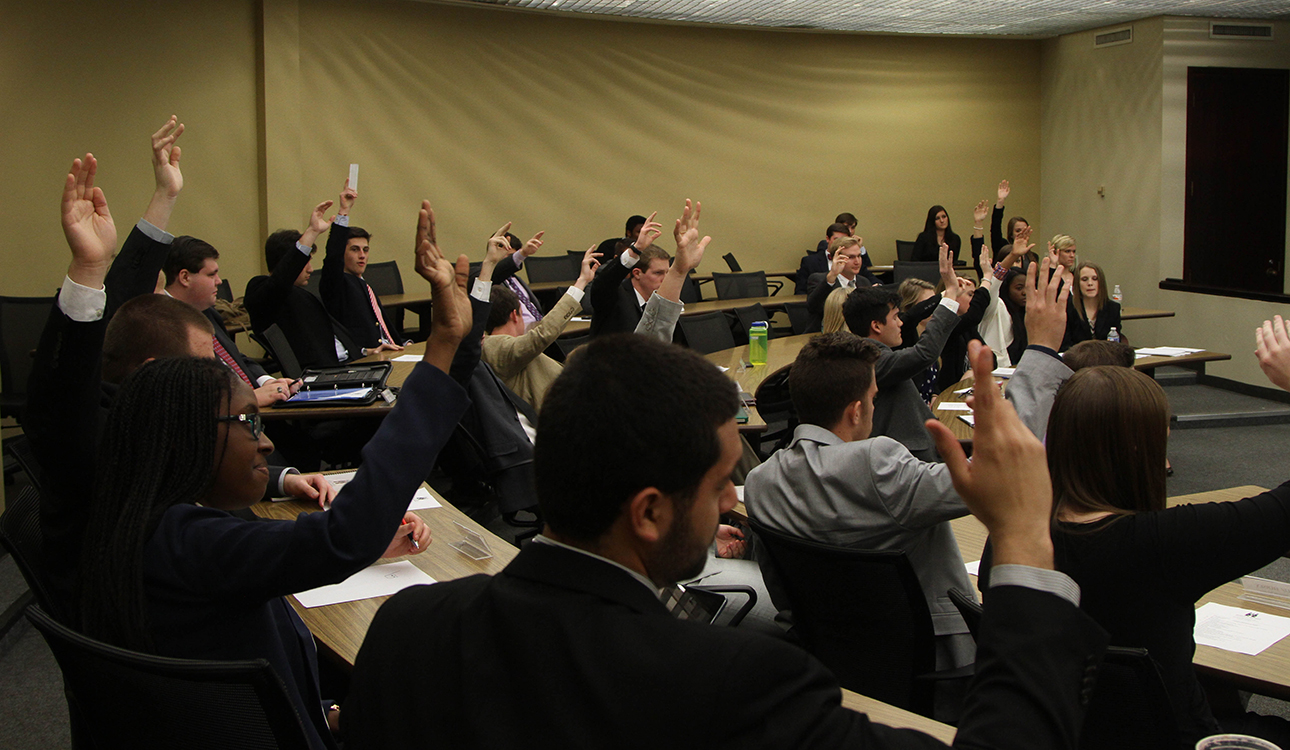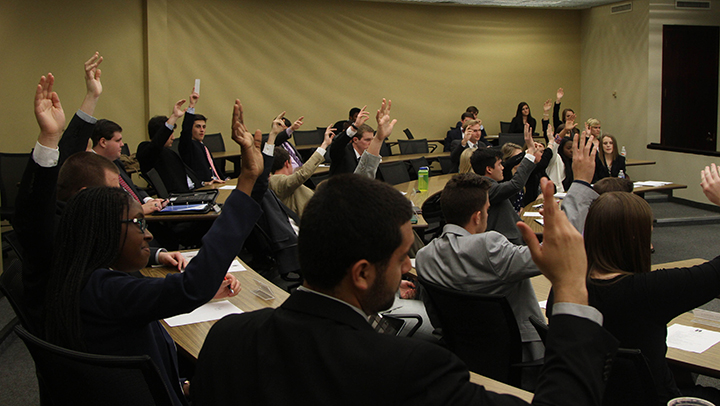

By Madison Miller and Reubin Turner
Reporter and City editor
Student Senate voted not to ask Woodinville, Wash., senior Gannon McCahill to resign in an executive session Thursday at the Student Senate meeting, said Port Barre, La., sophomore Lindsey Bacque, the public relations committee chair for the internal vice president.
The Student Senate has a new media policy this semester that prohibits senators from reaching out to the media without first obtaining approval from Bacque. The media policy is a part of the Student Senate bylaws. Senators who violate this policy will be brought before the Student Executive Council, Bacque said.
The policy states that any “discrepancies” will be decided by Katy junior Lawren Kinghorn, the president of the Senate.
“By channeling all media contact through the Public Relations Committee Chair, and when needed, the President of Student Senate, Student Senate and Student Government achieve a more unified voice,” the policy states.
This policy only applies when the senator is disclosing information obtained because of his or her position in the Senate. The senator would not be brought before the Student Executive Council for action if the media contacts him or her first.
Previously, the media policy stated, “Furthermore, the Public Relations Committee Chair shall act as a liaison between Student Senate and all journalistic media outlets, the Baylor Lariat.”
When asked about the proceedings, Bacque said she was not allowed to discuss the vote regarding McCahill because it was during an executive session.
“That’s something that can’t be disclosed other than to the people who were in the room,” Bacque said.
Bacque later disclosed the outcome in a statement, stating McCahill was not asked to resign by the Senate.
This comes in the midst of a pending lawsuit against Kinghorn by McCahill and San Antonio junior Chase Hardy.
The public hearing for McCahill, Hardy v. Kinghorn will begin at 6 p.m. Monday in room 127 of the Baylor University Umphrey Law Center. The hearing is open to the university community.
Multiple members of Student Senate, who asked not to be named, cited attendance violations as the cause of McCahill being brought before the Senate for his resignation.
This is the second time during the 62nd legislative session McCahill has been brought before the Senate for violations regarding the attendance policy.
McCahill was also brought before the Senate on the same charge in November, and after a vote he was not asked to resign.
“This is the first time during my tenure as a senator that someone has been asked to resign for five absences,” said a student senator, who asked to remain anonymous, referring to charge in November.
The source said five absences is the bare minimum required to be called in by the Senate Executive Council, according to the Senate bylaws, and there were several senators last year who had five or more absences but were not called in.
“McCahill wrote a controversial gun bill, he was asked to resign. He sues Kinghorn, he’s asked to resign. It just seems strange,” the source said.
In addition to the executive session, two bills regarding a plaque hanging in the Hankamer School of Business and changes to the electoral code within student government both passed unanimously.
The Arthur Andersen Adjustment Act recommended the name Arthur Andersen be removed from a plaque located in the Hankamer lobby.
The sign currently reads “These employees of Arthur Andersen espoused the highest of personal and professional integrity, bringing credit to Baylor and their profession.”
Arthur Andersen, one of the five largest auditing and accounting firms that partnered with Enron, collapsed in 2001 due to unethical practices and misrepresentation of earnings.
“I was kind of amazed that we hadn’t taken down the Arthur Andersen plaque already,” said Jefferson City, Mo. senior Paul Kiekhaefer, a student senator.
This bill was brought to San Antonio junior Chase Hardy, a student senator’s, attention by Colleyville senior Kaili Garcia.
“Some of the employees went to Baylor,” Hardy said. “They were good honest people who were part of a company doing dishonest things.”
The second bill was in regard to revisions of the electoral code concerning deadlines and the fluidity of elections.
The bill states “The Electoral Code currently lists deadlines and time periods for candidacy that do not align well with the Baylor University academic calendar.”
Linda Wilkins contributed reporting to this story.





